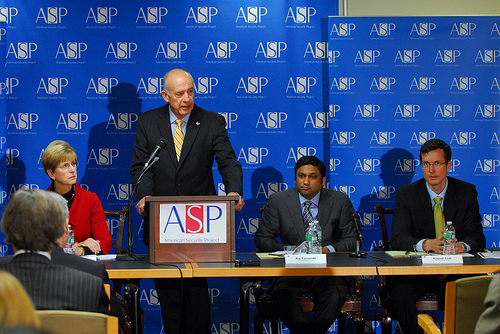
ASP Launch Event: American Competitiveness Report – An Issue of National Security
On November 28th, the American Security Project launched its new work entitled, “American Competitiveness Report – An Issue of National Security”, which links America’s global competitiveness to its national security and provides a framework for politicians to determine a long-term, viable path forward. The report was launched early this morning at an event featuring: Lieutenant General John Castellaw, USMC (Ret.); former Governor of New Jersey Christine Todd Whitman; ASP Board Member and CEO of Chopper Trading LLC., Raj Fernando; and August Cole, ASP Adjunct Fellow and former Wall Street Journal reporter.
Click here for the full report.
Click here for the audio of the event.
Lieutenant General Castellaw began by highlighting the multifaceted nature of national security. He emphasized that national security is not only a bipartisan effort, but that it also requires public and private cooperation. Alongside this, national security is more than just military strength; it depends greatly upon other factors such as economic vitality, infrastructure, and education.
Gov. Christine Todd Whitman discussed the purpose of ASP’s report and America’s current competitiveness status. Speaking from her recent experience with Hurricane Sandy and the devastation it caused her home state, New Jersey, Gov. Whitman highlighted America’s beleaguered infrastructure. According to the World Economic Forum’s “Global Competitiveness Report 2012-2013”, the U.S. ranks at a woeful 20th out of 144 nations for its overall infrastructure rating. In this very same report, the U.S. ranked 7th in terms of overall competitiveness. Our education is also suffering, particularly in the science, technology, engineering, and math (STEM) fields. Clearly America’s lost its direction.
Currently, the fiscal discussion dominates America’s public sphere. Our national debt, according to Gov. Whitman, is starting to define us. National security and American competitiveness must be about more than just our national debt. America’s decision makers need to change the way they think. They need to look further forward, and not just react to crises but anticipate them. America needs serious investments in education and infrastructure, and it needs to reform its failing immigration system. The purpose of ASP’s report is to provide critical decision makers with a fact-based source that can help guide them as they make the decisions that affect America’s global competitiveness and national security.
Raj Fernando, CEO of Chopper Trading, closed off the panel’s presentation by focusing upon the three sectors he believes will push America to be as successful in the 21st century as it was in the 20th: America’s infrastructure, its education, and its immigration system.
Fernando argued that, in this current period of low interest rates and unemployment, America needs to invest in its infrastructure to create jobs, reduce the deficit, and plant the seeds for future growth. A key tool to America’s investments in infrastructure should be public-private partnerships. Although the private sector spends money more efficiently, a joint effort from public and private firms is necessary to proper infrastructure investment. Long term projects often need government involvement. Investing in infrastructure can also save America future expenditures, especially when it comes to preparedness measures. According to research done by Neil Malhotra of the Stanford Graduate School of Business, “$1 in preparedness spending is worth $15 in relief payments in preventing future disasters”. Sandy made this fact clear.
Our education system also needs dramatic reform. College costs continuously rise and America’s K-12 system is overwhelmed and inadequate. America ranks 27th among developed nations in the proportion of college students receiving undergraduate degrees in science and engineering. We also face a huge STEM shortfall, as our students emerge from America’s educational system unable to qualify for the available jobs.
Tied in with America’s education issues is the U.S. immigration system. America educates the brightest foreign students but fails to envelop them back into its labor force. Many of these students are forced to leave after they are unable to get visas. Fernando used his own company, Chopper Trading LLC., as an example, citing the times that the U.S. immigration system lost him potential talented employees. To remain competitive, America’s immigration system must be reformed to keep drawing in international talent.
You can check our Raj’s blog here.
ASP’s “American Competitiveness Report – An Issue of National Security” provides a stepping stone for policy makers to move America forward, both competitively and securely. Although closing budget gaps is important, it is crucial that America looks at the major issues that underpin our competitiveness. In other words, to create a more competitive and secure America we must invest in new infrastructure, improve our education system, and reform our immigration laws.
Click here for the full report.
Click here for the audio of the event.
Check out our Flickr site for more images
Embedded below is a CNN interview with Governor Christine Todd Whitman about the fiscal cliff. In the video Gov. Whitman reiterates the linkage between American competitiveness and national security.






[…] ASP Launch Event: American Competitiveness Report – An Issue of National Security […]
[…] You can also check out the launch event of this report here […]
[…] You can catch the report, audio and video of the event here […]
[…] ASP Launch Event: American Competitiveness Report – An Issue of National Security […]
[…] Read more about the event at the American Security Project’s Flashpoint Blog. […]
[…] For an overview of the event click here. […]